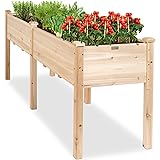Best Choice Products 72x23x30in Raised Garden Bed, Elevated Wood Planter Box Stand for Backyard, Patio, Balcony w/Divider Panel, 6 Legs, 300lb Capacity - Natural
17% OffQuictent Raised Garden Bed with Cover Outdoor Galvanized Metal Planter Box Kit, w/ 2 Large Screen Windows Mini Greenhouse 20pcs T Tags 1 Pair of Gloves Included for Growing Vegetables 6x3x1ft (Clear)
21% OffIntroduction to Organic Vegetable Gardening
If you’re new to vegetable gardening, or if you’ve been growing veggies for years but want to switch to organic methods, this guide is for you. Organic vegetable gardening is a great way to grow healthy produce while also being kind to the environment. By using natural fertilizers and pest control techniques, you can create a thriving garden that produces delicious fruits and vegetables without harmful chemicals.
Choosing the Right Plants and Seeds for Your Garden
The first step in any successful vegetable garden is choosing the right plants and seeds. Consider your climate, soil type, and personal preferences when selecting which crops to grow. Some popular options include tomatoes, lettuce, carrots, beans, and peppers. You may also want to consider heirloom varieties, which are often more flavorful than hybridized versions. When purchasing seeds, look for those labeled as organic or non-GMO.
Preparing the Soil for Planting
Once you’ve chosen your plants and seeds, it’s time to prepare the soil for planting. Organic gardeners rely on compost, manure, and other natural materials to enrich the soil instead of synthetic fertilizers. You should also remove any weeds or debris from the area where you plan to plant. If necessary, till the soil to loosen it up before adding your amendments.
Tending to Your Garden: Watering, Feeding, and Pruning
During the growing season, you will need to tend to your garden regularly. This includes watering, feeding, and pruning your plants. Use a drip irrigation system or soaker hoses to conserve water and reduce waste. You can make your own organic fertilizer by mixing together ingredients like compost, fish emulsion, and kelp meal. As your plants grow, you may need to prune them to encourage bushiness and prevent disease.
Common Pests and Diseases in Vegetable Gardens
Even with careful attention, your vegetable garden may still experience some pests and diseases. Common problems include aphids, slugs, and blossom end rot. To combat these issues, use natural remedies such as neem oil, diatomaceous earth, and companion planting. It’s also important to rotate your crops each year to avoid soil depletion and pest buildup.
Harvesting and Storing Your Homegrown Produce
Finally, once your vegetables have matured, it’s time to harvest and store them. Depending on the crop, you may be able to eat them fresh or preserve them for later use. Popular preservation methods include freezing, canning, and pickling. Be sure to follow safe food handling practices to ensure that your family stays healthy.
In conclusion, organic vegetable gardening is both rewarding and challenging. With the right planning, care, and dedication, you can grow a bountiful harvest of tasty, nutritious produce while also protecting the planet.















































